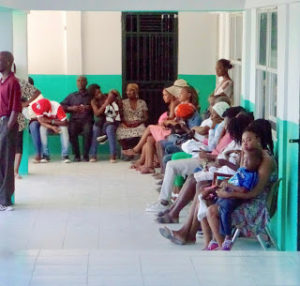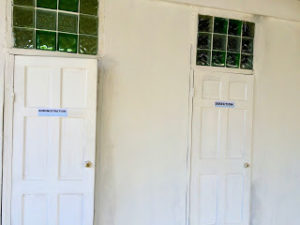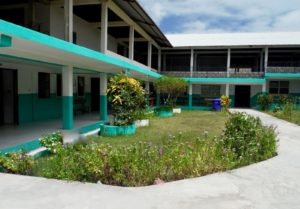 WRITTEN BY: MARK FULTON
WRITTEN BY: MARK FULTON
It was a hot, busy Monday afternoon at Hôpital L’Eglise de Dieu Réformé in Saint Ard. Over 100 patients and their families were waiting and receiving care in the main area of the hospital as the all-indigenous staff directed, managed, and guided the needed treatments. The noise and activity flooded us with the awareness of the needs of the people around us.
We soon buried ourselves in a quieter small office on the second floor of the facility, as the leadership team of the hospital began a necessary planning meeting. The discussion was focused on two main items: defining and funding the payroll taxes as described by the Haitian government, and defining the funding needed to move the hospital from a Monday to Friday urgent care center to a 24/7 hospital with inpatient services. The discussions began and the 30-minute meeting spread into an hour and then continued on.
 If someone during my career life in the US had asked me to attend a leadership meeting like this while there was patient care going on around me, I would have said “No, thank you! I am really too busy!” or “What are you, nuts?” But this time, it was different. This time as Kathy and I sat behind the other members of the leadership team, who are all Haitians, we listened. We provided less than 10% of the conversation but still found the all-in-Kreyòl meeting to be maybe not exciting, but definitely rewarding. This time, the staff was taking the leadership role. The staff was directing the conversation. The staff was getting excited about the possibilities. The staff was taking ownership. It seemed that a corner had been turned! Kathy and I were taking a “back seat” in the project. Taking a back seat doesn’t come naturally to me (or many US folks) but has always been and continues to be a goal as we work toward indigenous sustainability here in Haiti.
If someone during my career life in the US had asked me to attend a leadership meeting like this while there was patient care going on around me, I would have said “No, thank you! I am really too busy!” or “What are you, nuts?” But this time, it was different. This time as Kathy and I sat behind the other members of the leadership team, who are all Haitians, we listened. We provided less than 10% of the conversation but still found the all-in-Kreyòl meeting to be maybe not exciting, but definitely rewarding. This time, the staff was taking the leadership role. The staff was directing the conversation. The staff was getting excited about the possibilities. The staff was taking ownership. It seemed that a corner had been turned! Kathy and I were taking a “back seat” in the project. Taking a back seat doesn’t come naturally to me (or many US folks) but has always been and continues to be a goal as we work toward indigenous sustainability here in Haiti.
As the meeting went on, the funds needed to sustain and grow the hospital were determined as closely as humanly possible. The reality of the financial magnitude of the project placed a small damper on the enthusiasm of the group but not to the point of making them overwhelmed. At one point, it was stated that, “We <Haitians> cannot always be dependent on Mission Haiti Medical <outside influences> but need to be as independent as possible.” If I could dance, I would have danced! Some additional expenses were fleshed out and the goals were determined. The meeting was adjourned.
The reality of the outcome of the meeting is that neither the Haitian staff nor Kathy and I knew exactly how we would meet the entirety of this new financial goal. No one had voiced that it seemed beyond our current scope but sensing that obstacle, and without saying a word, one of our good friends on the leadership team stayed behind, grabbed my hand and Kathy’s hand, making a circle of the three of us, and began to pray. He prayed that, if it is God’s will, that the hospital have what it needs to open 24/7 soon. He prayed that while some things seem impossible, with God all things are possible. He articulated the difference that a hospital in the area could save the lives of so many but still, God, we bow to you and your control.
When the “Amen” was said, we embraced and parted ways. As we opened the door, the din of the hospital patients below the office re-entered our lives. The physical needs of the patients were once again brought to the fore as those with different medical crises were seen awaiting care. As we saw the needs spread before us, we again realized that the ability to care for all of them was far beyond the long-term scope of a couple of US missionaries. The ability for the indigenous Haitian staff to shoulder the whole responsibility of healthcare, at least in the current financial state of the area, is a ridiculous request. The amount of money needed to quickly improve the facility is just an outlandish thought. BUT regardless of the outcome, our job is to join hands, pray, believe, and follow the one who can make it all happen.
 We continued to watch as the patients in front of us, one at a time, were cared for. The busyness and noise subsided. The line had finally disappeared and, at this moment, all there had been helped. One day at a time. One patient at a time. One prayer at a time. So until the next step, we work, often impatiently, to turn all of the projects over to God, the original “indigenous personnel”, who was, and is, and is to come.
We continued to watch as the patients in front of us, one at a time, were cared for. The busyness and noise subsided. The line had finally disappeared and, at this moment, all there had been helped. One day at a time. One patient at a time. One prayer at a time. So until the next step, we work, often impatiently, to turn all of the projects over to God, the original “indigenous personnel”, who was, and is, and is to come.